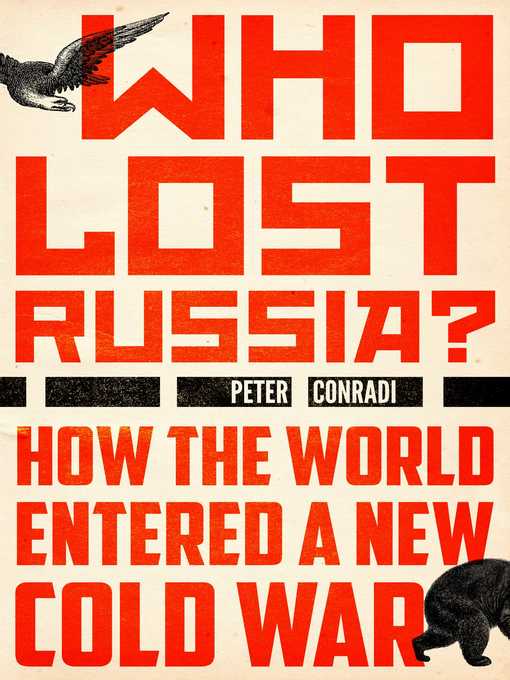
Who Lost Russia?
How the World Entered a New Cold War
کتاب های مرتبط
- اطلاعات
- نقد و بررسی
- دیدگاه کاربران
نقد و بررسی

Starred review from February 27, 2017
In this balanced and timely work, Sunday Times foreign editor Conradi (The Great Survivors) charts the complex and turbulent course of U.S.-Russia relations since the collapse of the U.S.S.R., and investigates how the end of the Cold War failed to result in either conciliation or superpower cooperation. Working from exclusive interviews with principal players and assorted other sources, Conradi details how occasional moments of tentative cooperation—arms control deals, post-9/11 collaboration, the Iran nuclear deal—have masked a relationship fraught with tension, fundamentally different perspectives, and mutual misunderstandings. Russia’s primary sources of concern include NATO’s “relentless march eastward,” the NATO bombing of Yugoslavia, perceived American political malfeasance in former Soviet territories, and Washington’s insistence on a U.S.-centered unipolar world order that ignores Russia’s desire to be treated respectfully and “as an equal.” Such factors, Conradi argues, contributed to Russia’s “sense of humiliation and encirclement.” The U.S. has taken issue with Russian President Putin’s growing domestic authoritarianism and “newfound assertiveness” abroad: intervention in Georgia, support for separatists in Ukraine, the annexation of Crimea, and a role in the Syrian Civil War. Conradi blends these developments into a smooth narrative that provides welcome context for Russia’s recent revanchist behavior and insight into prospects for ongoing U.S.-Russian relations. Agent: Andrew Nurnberg, Andrew Nurnberg Associates (U.K.).

February 15, 2017
A systematic account of Russia's emergence from the wreckage of the Soviet Union with a renewed sense of authoritarian mission.There isn't really anybody to blame for "losing" Russia except for "its own creators." In this painstaking account, Sunday Times foreign editor Conradi (The Great Survivors: How Monarchy Made It into the Twenty-First Century, 2012, etc.) meticulously lays out the record, from Mikhail Gorbachev to Vladimir Putin. The author emphasizes that with the fall of the Soviet Union, the Russians were more preoccupied with their own economic viability than with political woes--a fair assessment considering the sudden collapse of price controls in the early 1990s and rise of hyperinflation. As privatization was carried out painfully in Russia under Boris Yeltsin, the West did not lend its aid in a gushing "new Marshall Plan." The minority countries formerly behind the Iron Curtain moved for independence, prompting military action in 1994 against Chechnya and a conflicted reaction by the Russian people and consternation by the Bill Clinton administration. The enlargement of NATO delighted the U.S. but alarmed the Russians, while the disintegration of the former Yugoslavia and loss of Ukraine compounded Russia's isolation. Conradi notes that all Russia needed, at the end of Yeltsin's regime, was "a figure able to harness this sense of grievance and thirst for revenge," and Yeltsin handpicked his successor in former KGB officer Putin in late 1999. After assuming power, Putin gradually slid into old Soviet-style authoritarianism--e.g., the arrest and Siberian exile of Mikhail Khodorkovsky, head of the oil giant Yukos; the Russian storming of the school taken hostage in Beslan, North Ossetia, in September 2004; and the resistance to the detaching of Ukraine from Russia's orbit and invasion of Crimea in 2014, among other developments. Despite the "reset" button pushed by President Barack Obama and his Secretary of State Hillary Clinton, Putin has continued to show a desire to re-create the lost Soviet empire. A cold-eyed examination of recent Russian history that seems to show that there was never a solid plan to integrate Russia into the West.
COPYRIGHT(2017) Kirkus Reviews, ALL RIGHTS RESERVED.

April 1, 2017
Journalist Conradi (foreign editor, Sunday Times) has authored a fine narrative of postcommunist Russia's relations with the United States and Europe. Its subtitle implies comparisons with relations to the former Soviet Union, and surely they emerge. The geography of conflict still includes NATO, the Middle East, and Yugoslavia's successors. Russian President Vladimir Putin's foreign policy decisions seem no less challenged than those of Joseph Stalin, and Putin's legitimizing doctrine of "Eurasianism" packs the same anti-Western punch as communism once did. Conversely, the former organizing role of nuclear deterrence has diminished. The practice of summitry languishes, as successive U.S. administrations find thwarted initial attempts at better communications with the Kremlin. However, Conradi does not spare criticism of Western policy. Some readers might dispute his assertion that the "main reason" for Russia's Crimean annexation emerged from "fear" that NATO would expel Russia's Black Sea Fleet from Sevastopol should Ukraine join the alliance. VERDICT While a balanced, detailed, and workman-like account of international politics over the last quarter century, this book is unlikely to be the last word on "the new cold war."--Zachary Irwin, Behrend Coll., Pennsylvania State Erie
Copyright 2017 Library Journal, LLC Used with permission.

























دیدگاه کاربران